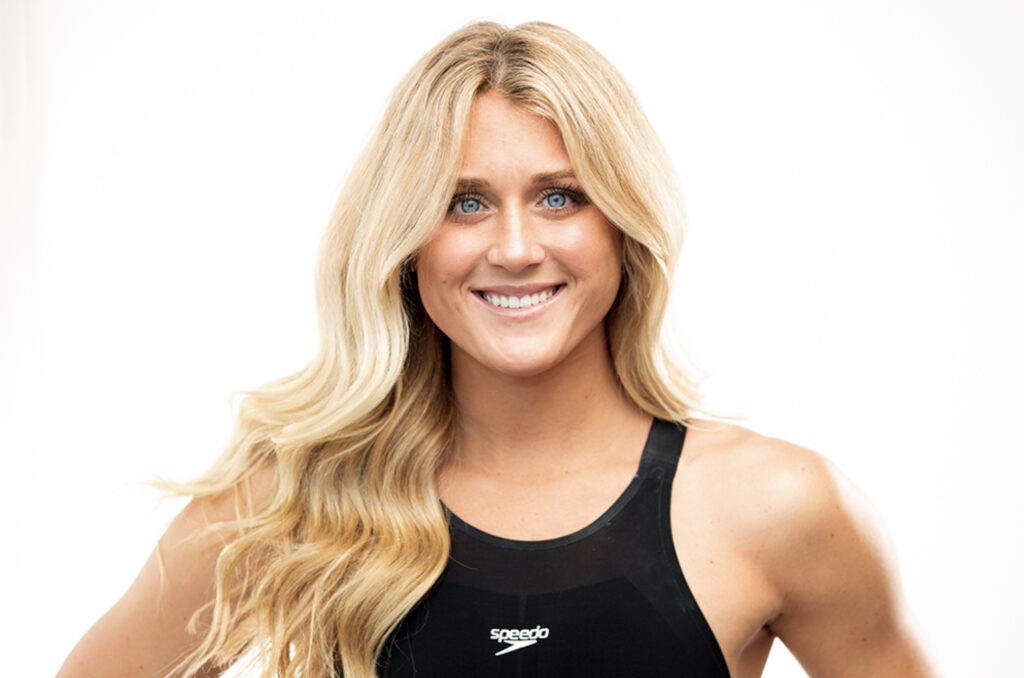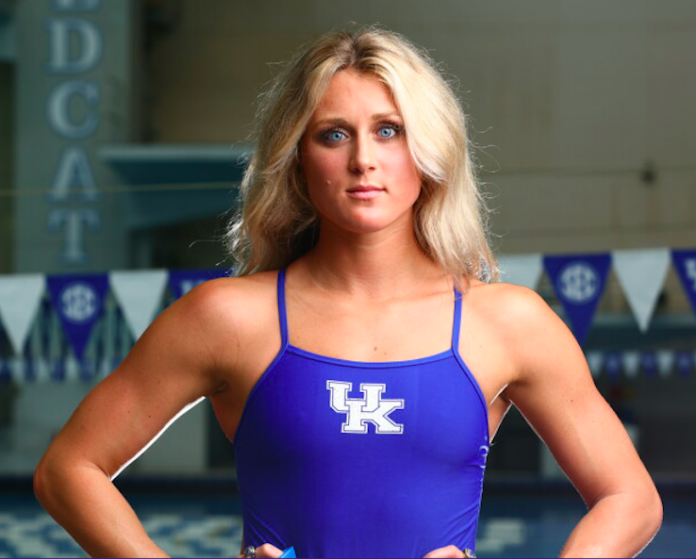Riley Gaines, 23, skyrocketed to national attention when the NCAA allowed a man, Will Thomas, posing as a woman to compete against Gaines and others at the women’s 200-yard freestyle final at the NCAA swimming and diving championships in Atlanta in 2022. Gaines and Thomas tied in the race, but the NCAA awarded him the trophy for openly political reasons.
“I never thought it would be courageous to say that men and women are different. And I never thought, having said those things, it would blow up into what it has for me,” Gaines told The Conejo Guardian during a recent visit to the Conejo Valley. “This is never a conversation I thought we would have to have. It seems like the most basic of conversations.”
Up to that race, Gaines was an NCAA Division 1 swimmer at the University of Kentucky, with no greater ambition than winning and then becoming an endodontist after graduating. In her swimming career, Gaines was a 12-time NCAA All-American, a five-time SEC champion, an SEC record-holder in the 200 butterfly, a two-time Olympic trial qualifier, SEC Scholar Athlete of the Year, and SEC Community Service Leader of the Year.
The pivot point came on March 17, 2022, when the NCAA made Gaines and the other female swimmers compete against male swimmer Thomas, who had changed his name to Lia. Thomas had competed for three years on the University of Pennsylvania men’s swim team before deciding to call himself a woman.
Gaines later related the experience of that day to a Senate committee: “We watched on the side of the pool as Thomas swam to a national title in the 500 freestyle, beating out the most impressive and accomplished female swimmers in the country, including many Olympians and American record holders by body lengths.”
In her race against Thomas, Gaines and Thomas tied.
“We went the exact same time down to the hundredth of a second. Having only one trophy, the NCAA handed it to Thomas and told me I had to go home empty-handed,” Gaines testified. “And when I asked why, which was a question they were not prepared to be asked, I actually appreciate their honesty because they said it was crucial Thomas had it for picture purposes. … I felt betrayed. I felt belittled. I felt reduced to a photo op. But my feelings didn’t matter. What mattered to the NCAA were the feelings of a biological male.”
In a further humiliation, the NCAA “forced me and my female swimmers to share a locker room with Thomas, a six-foot-four, 22-year-old male equipped with and exposing male genitalia,” she said. “Let me be clear about this: We were not forewarned we would be sharing the locker room. No one asked for our consent, and we did not give our consent. … If nothing else, I truly hope how you can see this as a violation of our right to privacy and how some of us have felt uncomfortable, embarrassed, and even traumatized by this experience.”

Gaines recalled “extreme discomfort in the locker room” and heard “whispers and the grumbles of anger and frustration from these girls who just like myself had worked our entire lives to get to this meet.”
Sixteen months after that fateful race, Gaines is now married and setting up house in a Midwestern state — and embracing her role as spokeswoman for girls in sports.
“They want you to think that you’ll be canceled if you talk about this or if you say anything,” she told the Guardian, “but really, it has only opened doors for me and presented me with a lot of opportunities which ultimately have changed the trajectory of my life. … I realized you have to learn as you go, you have to be willing to , you have to be adaptable. So this past year, I’ve taken a big risk and said yes — yes to every opportunity, every media hit, anything I could do to put myself in a position where we as women and female athletes couldn’t continue being ignored.”
What prepared her for her sudden role as champion of girls in sports?
“I think a few things,” Gaines said. “One, playing sports, especially at the level I did, gave me the leadership to do what I’m doing. There is so much value to playing, to competing. It’s more than just athletic achievement; it’s building those lifelong characteristics that translate far beyond your sport. It’s given me the confidence and security.”
“Be bold. Be empowered and know that you’re in the majority in thinking that men competing against women and changing in our locker rooms is lunacy.”
Riley Gaines
Secondly, she said, was her faith.
“I’ve always been spiritual, but this past year, I really have seen clearly how God works and moves, but also how his opposition works and how he moves,” she told the Guardian. “So it’s a lot of prayer, a lot of conversations with those around me who I know are strong in their faith.”
Standing strong against heavy-handed COVID policies also strengthened her for future battles.
“During all of the vaccines and stuff like that, especially competing at a university and being a student-athlete where they tried to force us to get our vaccine — that was the first time where I stood up to the administration and the authority figures and said, ‘No. We don’t have to do this, and I’m not going to do it,’” she says. “That kind of eye-opened me to how they want to control what we’re saying, we think, how we feel, what we do and ultimately what we put in our bodies. That’s really concerning. Our government should not have this authority over us.”
After famously “losing” the race to Thomas — who now publicly supports violence as a means to promote gender dysphoria — Gaines graduated with her degree in human health sciences and health law. But her main focus is fighting for the rights of women in athletics.
“Women’s rights to privacy, single-sex spaces and opportunities are being encroached on,” she told lawmakers on Capitol Hill in June. “Sports, sororities, locker rooms, dorm rooms, shelters, prisons. Some have tried to tar those of us speaking up for women’s safety, security and opportunities as transphobic or bigoted, and this is untrue. … Defending women’s rights is not anti-anyone, believing in biology is not bigoted, and following the science that there are only two sexes and that there are very real and important differences between the two sexes is not hateful, it’s fact.”
Carrying that message forward, says Gaines, makes her feel she’s back on a winning team.
“I love competing under pressure,” she told the Guardian. “What I’m doing now feels very similar to playing my sport at a high level.”
She has a message for girls in the Conejo Valley:
“Be bold. Be empowered and know that you’re in the majority in thinking that men competing against women and changing in our locker rooms is lunacy,” she says. “The overwhelming majority of even the Democratic Party knows this is wrong. … It’s liberating to say the truth. Once you speak that truth and you don’t have to adhere to the narrative that they’re pushing, it feels like a weight is off your shoulders. Courage begets courage, and there is strength in numbers, so I’m encouraging everyone to be courageous. They will label you names to try to deter you from speaking up, but all it is, is name-calling. We have common sense on our side. We have truth, we have science, logic and reasons all on our side. That’s why they resort to personal attacks. Once they do that, let that be an indicator that you’re doing the right thing.”
Gaines’ “Gaines for Girls” podcast launched in July to promote fairness in women’s sports and expose the war on women and children.
“[It’s about] advocating for those who are scared, those who don’t yet have a voice, those younger girls,” Gaines told the Guardian.
Podcast guests will include elite athletes, policy experts, medical professionals and people like her who have lost something because of the new gender ideology.
As she told the Senate committee, “I hear these female athletes and their parents. I hear from these people who are seriously injured, one with permanent injuries that will plague the rest of her life because she was forced to compete against a much physically stronger man. This is unacceptable, and the integrity of women’s sports is lost. It’s unfair. It’s discriminatory, and it must stop.”


Shame on the NCAA to allow a mentally ill MAN to change with underage girls and women…
Those NCAA representitives need to be tired for child endangerment!! A discusting unforgivable act!!
She is my hero!